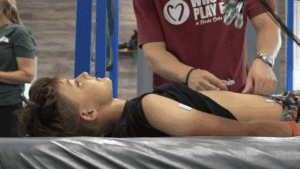
Find step-by-step instructions, helpful tips, and FAQs to enhance your experience.
Step-by-step guidance on setup, use, and safety to ensure accurate and reliable results.
Common issues and solutions (Bluetooth pairing, noise reduction, electrode problems).
Sudden Cardiac Arrest (SCA) in youth is often caused by underlying heart conditions such as hypertrophic cardiomyopathy, long QT syndrome, and other electrical abnormalities. ECG screening can detect many of these before symptoms occur, allowing for early intervention.
The machine meets FDA clearance/CE marking standards and is validated against international criteria for pediatric ECG interpretation, including the latest athlete screening guidelines. The false positive rate when performing ECGs with the Cardea 20/20 is <2%. This ensures that only those children with detected risk are referred for additional evaluation.
Typically, 5–10 minutes from setup to completion, including placing electrodes and generating the report.
A trained member of your staff can operate the machine after a brief onboarding session, or a designated screener can be provided.
The ECG machine produces a digital report. Readings can be reviewed by an in-office physician or sent securely to a cardiologist or reading service for confirmation.
Any abnormal findings will trigger an alert, and the child will be referred for further evaluation by a cardiologist.
Product Support Contact:
📞 Call (866) 554-3751 Ext. 2 (Monday–Friday, 6:00 AM – 5:00 PM Pacific Time)
📧 Email: [email protected]
Results are stored securely in the device software and/or uploaded to a HIPAA-compliant cloud system. They can be integrated into your EHR if needed.
Yes. All transmissions are encrypted and meet HIPAA privacy and security requirements.
Yes. Written parental consent is required before screening, especially if results are stored or shared.
Depending on program structure, screenings may be covered by grants, donations, or billed to insurance using CPT codes such as 93000, 93005, or 93241 (if applicable).
In many cases, yes if it is part of a comprehensive physical — but coverage varies by payer and indication. Some screenings may be offered as a community health service at no charge to families
Yes. Basic device operation training is provided at no cost; advanced interpretation training is optional.
Best practice for SCA prevention suggests baseline ECG in early adolescence and rescreening every two years before competitive sports participation.
ECG screenings can be scheduled during annual physical and sports clearance visits, or as part of special screening events.
A dedicated support team is available via phone, email, or remote login for troubleshooting.